Managing a notary business involves keeping client details accurate, tasks on schedule and follow-ups consistent. A CRM for notaries can simplify your workflow to reduce admin overhead and help you deliver a professional, reliable service.
In this guide, you’ll learn how CRMs support notaries and discover five tools to streamline your daily operations. You’ll also gain practical strategies to set up your system with confidence.
Key takeaways from CRM for notaries
A CRM for notaries is a tool that supports notary operations by centralizing client data, tracking performance and automating tasks.
It boosts productivity by streamlining client data management and automating key functions like email communication.
Choosing the right management tool helps you save time, keeps you organized and enhances customer experience as your small business grows.
A CRM like Pipedrive can help you easily design and manage your notary workflow. Try it out today with a 14-day free trial.
What is a CRM for notaries?
A customer relationship management (CRM) system for notaries is software that helps you organize client information, manage appointments and automate routine tasks in one place.
Instead of juggling spreadsheets, emails and paper notes, you use a single dashboard to track notary workflow step by step. CRMs for notaries often include tools for scheduling and client communication.
For mobile notaries and signing agents, this means spending far less time on admin and being free to focus on billable work and pursue business goals.
Tasks notaries can automate with CRM software
With a CRM, notaries can automate the following tasks right away:
Scheduling and customer management | Keep clients informed by automating confirmation and follow-up emails. Send clients notifications of their upcoming appointments to reduce no-shows. |
Document and workflow management | Stay organized by tracking client records and notarization tasks in a single dashboard. Automated workflows replace manual processes, ensuring no detail slips through the cracks. |
Centralize documentation | Keep all contracts and important documents in one place by sending trackable files. |
Scaling your business | Focus on increasing your caseload or expanding your team while automations handle tedious admin work in the background. |
Now that we’ve explored CRM systems’ benefits for notaries, let’s examine some of the top tools available.
The 5 best CRMs for notaries
We’ve compiled a list of the top 5 CRMs for notaries, considering features, usability and business outcomes.
1. Pipedrive
Pipedrive is an all-in-one CRM built for service businesses that need clear visibility into their client pipeline.
It gives notaries the tools to track clients, manage appointments and automate communication through a simple, visual dashboard.
One of Pipedrive’s strengths is its pipeline view, which allows you to set up stages for every step of your notary process, from booking to signing to payment. As you complete tasks, you can move clients along the pipeline to ensure you never lose sight of where each case stands.
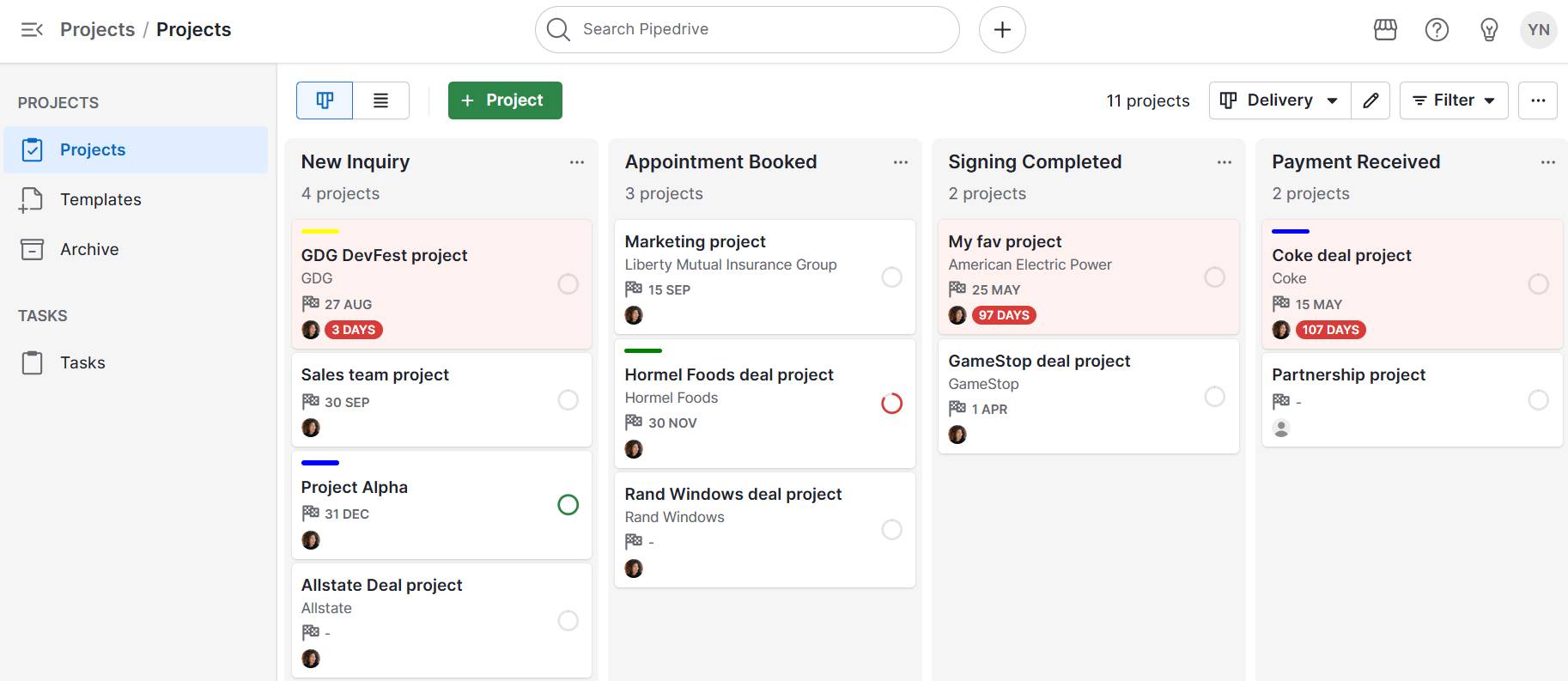
Pipedrive also supports automated reminder emails, follow-ups and task management. These features combine to boost efficiency, improve the client experience and support business growth.
A CRM helps you deliver a consistent, professional customer experience that builds trust, improves loyalty and encourages referrals
Pipedrive in action: GP Law Group, an LA-based personal injury and mass tort litigation firm, used Pipedrive to transform its workflows. Operating more efficiently allowed the firm to scale, doubling its team size and increasing its caseload capability by 160%.
In Australia, Network Financial Planning used Pipedrive to streamline its financial planning operations, boosting efficiency by 50% and growing its team from one to six.
With Pipedrive’s mobile CRM, notaries can update client records, check appointments and send confirmations from their mobile device in seconds.
As your notary business grows, Pipedrive adapts. You can manage more clients, track performance with custom reports and set revenue goals.
Notary businesses that engage in B2B marketing (e.g., to title companies or law firms) can use Pipedrive’s email marketing software to build professional communication funnels and email campaigns.
Note: Pipedrive integrates with popular calendar apps, e-signature tools and payment and tracking tools to help notaries build a connected workflow. It also integrates with popular accounting software to link bookkeeping and reporting to your CRM information for tax prep.
Key business outcomes with Pipedrive:
Full visibility of the client pipeline
Time savings with automation
A consistent, professional client experience
Scalable growth with reports and goals
For notaries who want to look professional while keeping admin light, Pipedrive offers a strong balance of flexibility, automation and ease of use.
Turn Maybe Into Yes With These Killer Follow Up Email Templates
2. NotaryAssist
NotaryAssist is a tool for notaries that focuses heavily on scheduling, invoicing and mileage tracking.
The software offers purpose-built notary features like expense tracking by signing, built-in reminders and templates for common notarial tasks.
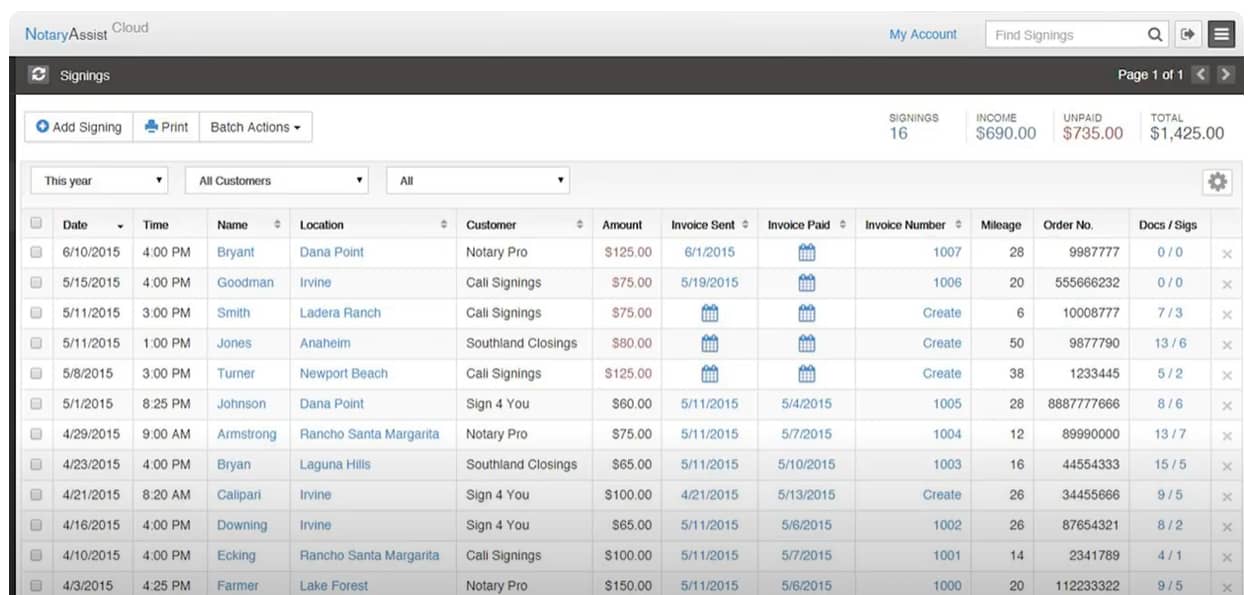
Key business outcomes with NotaryAssist:
Reduced scheduling conflicts and no-shows
Real-time visibility of income and expenses
Simplified tax prep and reporting
You can also use NotaryAssist to send invoices, track payments and generate tax-ready reports.
3. NotaryGadget
NotaryGadget is another notary-specific tool. Positioning itself as accounting software for notaries, it helps streamline invoicing and recordkeeping.
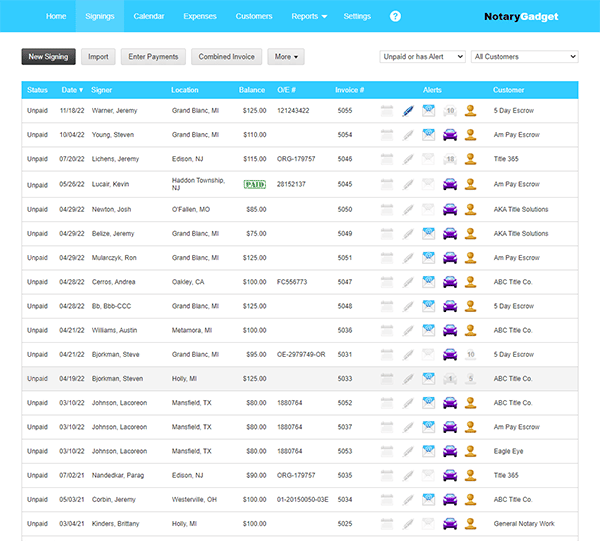
The software automatically calculates mileage, logs payments and links expenses to signing events.
Key business outcomes with NotaryGadget:
Time savings on recordkeeping and invoicing
Accurate financial tracking for each signing
Quick and confident tax reporting
Lightweight and simple, NotaryGadget also creates tax reports in just a few clicks.
Start generating quality leads with your B2B Prospecting ebook
4. Ontraport
Ontraport is a marketing automation and CRM platform that works well for notaries investing in client outreach.
It combines client management with tools for notary marketing and payment processing.
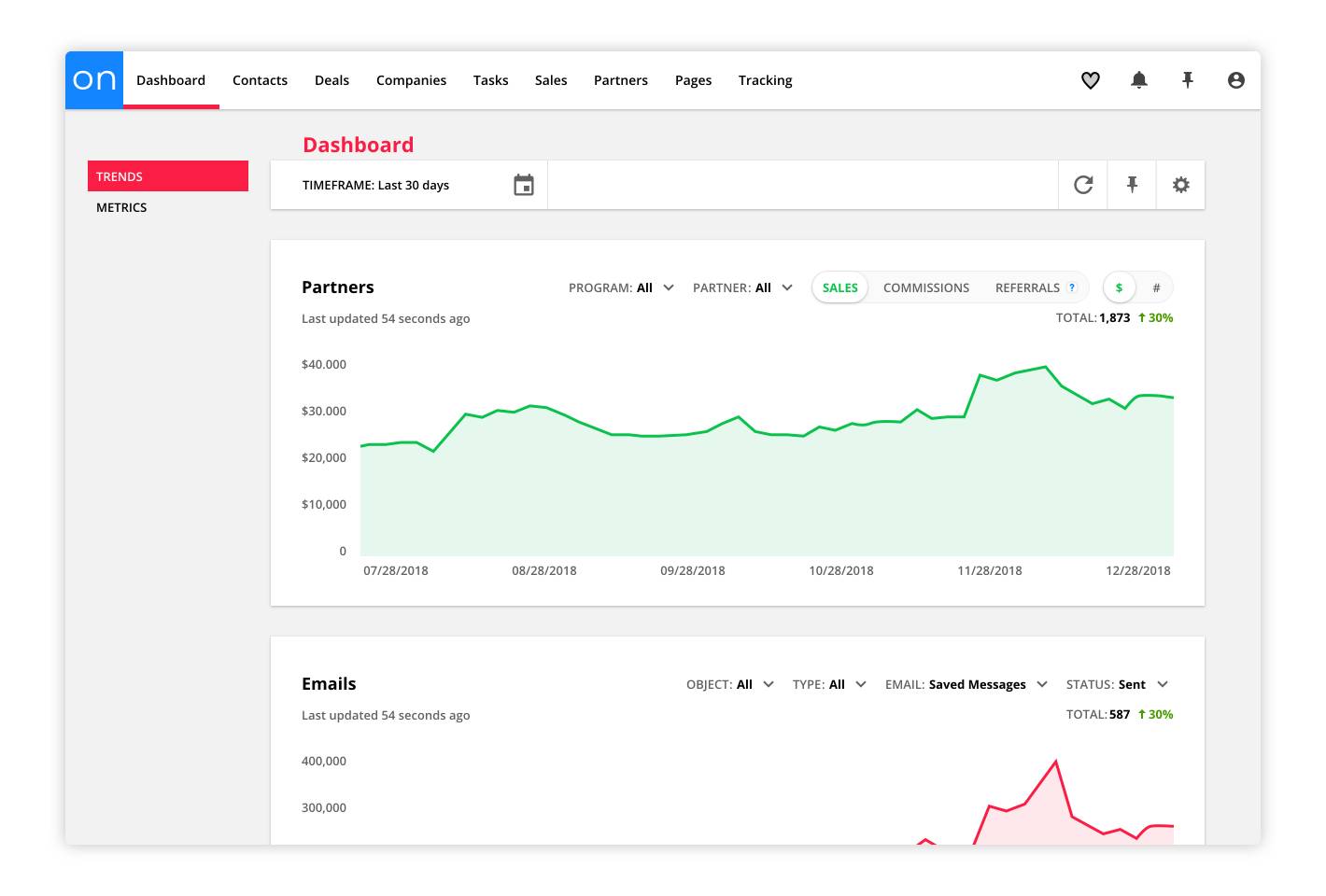
With Ontraport, you can set up sequences to nurture long-term relationships and track how clients engage with your business.
Key business outcomes with Ontraport:
Increasing repeat business and referrals
Maximizing sales opportunities
Strengthening client relationships
For notaries looking to expand into B2B prospecting, this kind of automation can save hours and increase client loyalty.
5. EasyWeek
EasyWeek is a scheduling-first platform with built-in CRM features.
It’s designed for service providers who want to simplify booking and client communication.
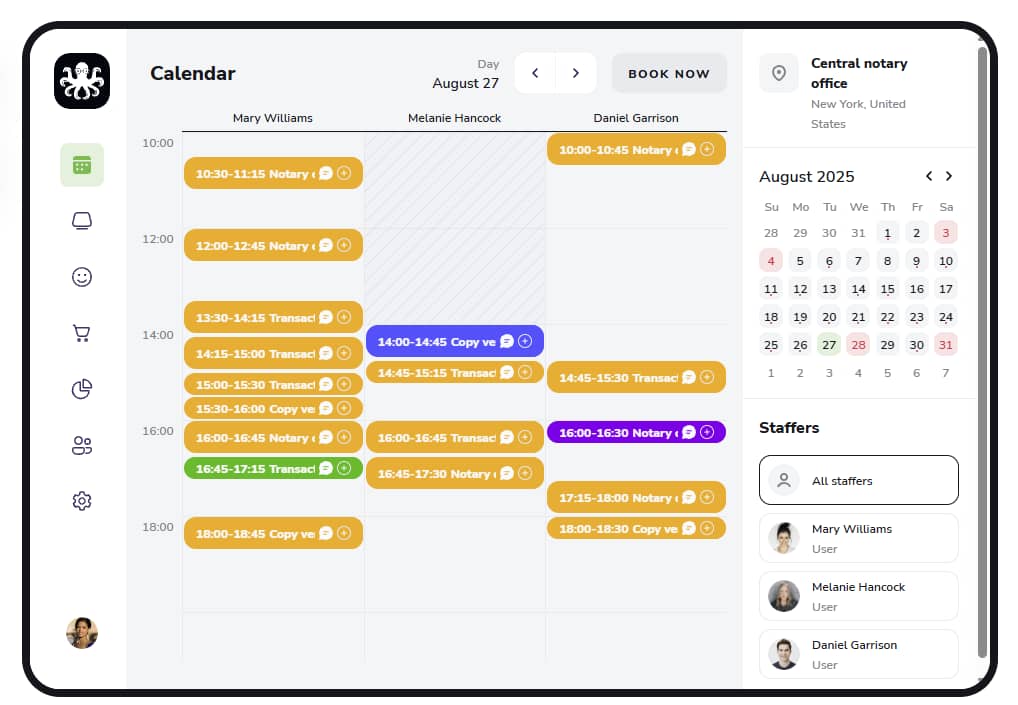
Notaries can use EasyWeek to publish an online booking page, send confirmations and automate reminders.
Key business outcomes with EasyWeek:
Minimize no-shows and booking errors
Deliver seamless remote notary services
Accept payments with less admin
EasyWeek also offers online payment processing and video conferencing tools that support the delivery of remote notary services.
How to choose the best CRM for your notary business
The best CRM for your notary business is the one that fits your workflow, budget and long-term growth plans.
Here are key factors to keep in mind when evaluating your options.
Prioritize features that support your workflow
More than anything, Notaries need a CRM that makes their everyday tasks easier.
When evaluating systems, start by making a short list of the must-have features for your notary business.
The list might include functionality such as:
If you do a lot of remote work, ensure the system you choose has a strong mobile web version or mobile app. That way, you can update records and confirm appointments on the move.
Prioritizing features that match your daily workflow will help you get the greatest value from your investment.
Consider pricing, scalability and ease of use
Price matters, but so does software’s ability to scale as your business grows.
Start with a plan you can afford, but make sure the CRM offers room to expand as your business handles more signings.
Ease of use is just as important – a simple dashboard could save you time and reduce mistakes instantly, while a steep learning curve would likely slow you down.
Look for helpful integrations and flexible features
Your CRM should work with the tools you already use.
These integrations can make your notary workflow smoother, boosting your CRM’s functionality and saving duplicated effort.
With this in mind, look out for software that connects with solutions like:
Calendar apps
E-signature software
Flexibility in CRM is also important, supporting you as your business expands. A CRM that allows you to customize your pipelines, templates and reports will give you scope to adapt without switching tools.
3 steps to set up a CRM for your notary business
Getting started with a CRM shouldn’t be overwhelming.
Following a few clear steps will help you set up your system and start seeing value immediately.
1. Import contacts and set up your workflow pipeline
Once you’ve chosen a CRM, import your client data.
Most systems let you upload contacts from spreadsheets or sync them from your email.
Next, create a pipeline that reflects your workflow. For example, your stages might include:
“New inquiry”
“Appointment booked”
“Signing completed”
“Payment received”
Setting up a clear pipeline ensures you track every client from first contact to final payment.
Download your free business continuity plan template
2. Automate routine tasks
With your workflow pipeline in place, you can set up automations to handle repetitive admin work in your notary business.
Depending on your priorities, you might want to start by setting triggers for client reminders, booking confirmations or follow-up emails.
If you run a large notary business or work in a team, you can use the CRM to assign tasks to other team members. Here’s an example in Pipedrive:

By prioritizing the tasks that currently take the most time, you can gain some “quick wins” from your new CRM and free up some time immediately.
3. Track performance with the software’s reporting tools
The final step of setting up a notary CRM is familiarizing yourself with the software’s reporting features.
Depending on the CRM’s functionality, you may be able to generate reports on metrics like:
Number of signings you’ve completed
The number of client no-shows you’ve had
For example, you can use Pipedrive to generate a deal revenue forecast:
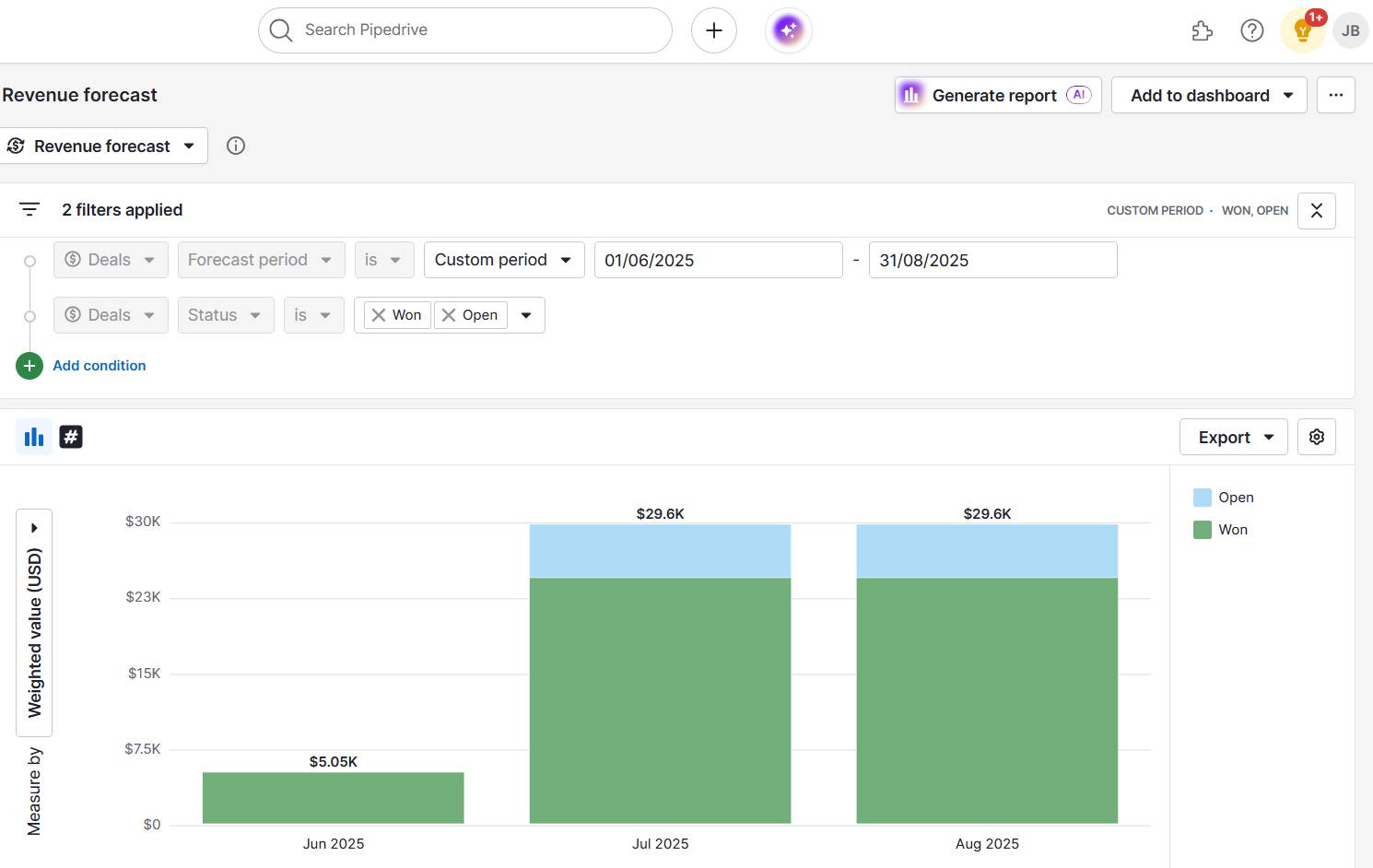
Reviewing relevant business data regularly allows you to spot trends, set goals and make better decisions.
Sample notary workflow using a CRM
Notaries can use CRMs in various ways, but they will likely return to certain workflows repeatedly. Let’s look at a typical workflow, using Pipedrive as an example.
Step 1: Booking
Imagine a busy notary, Maria, who handles five to six appointments a day.
Her day starts with booking. One client schedules a power of attorney signing online, while another calls to set a last-minute appointment.
Maria enters both appointments into Pipedrive using the software’s scheduling tool.
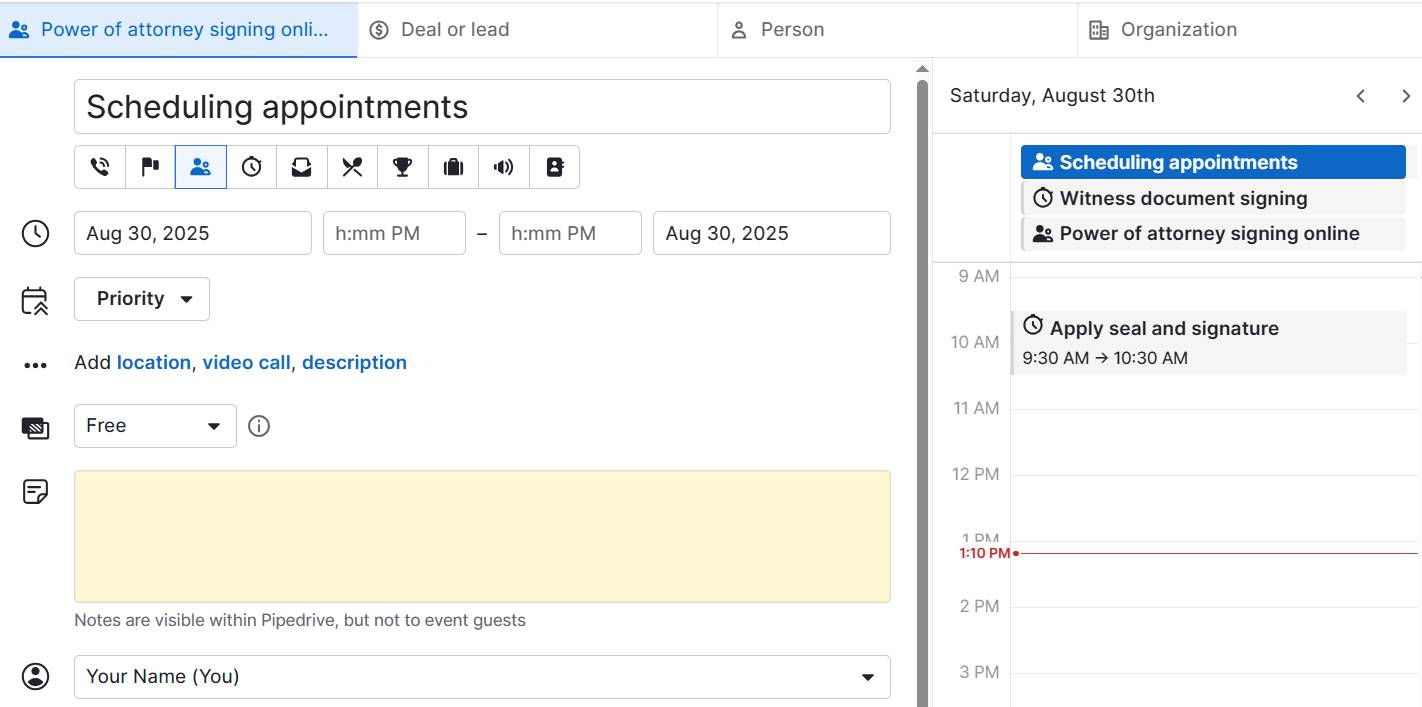
The system automatically stores client names, contact info and appointment times.
Maria can also use Pipedrive to record special instructions, like notarizing multiple documents or verifying ID types.
Step 2: Appointment
Before each meeting, Maria prepares for the appointment by reviewing the client’s record in Pipedrive.
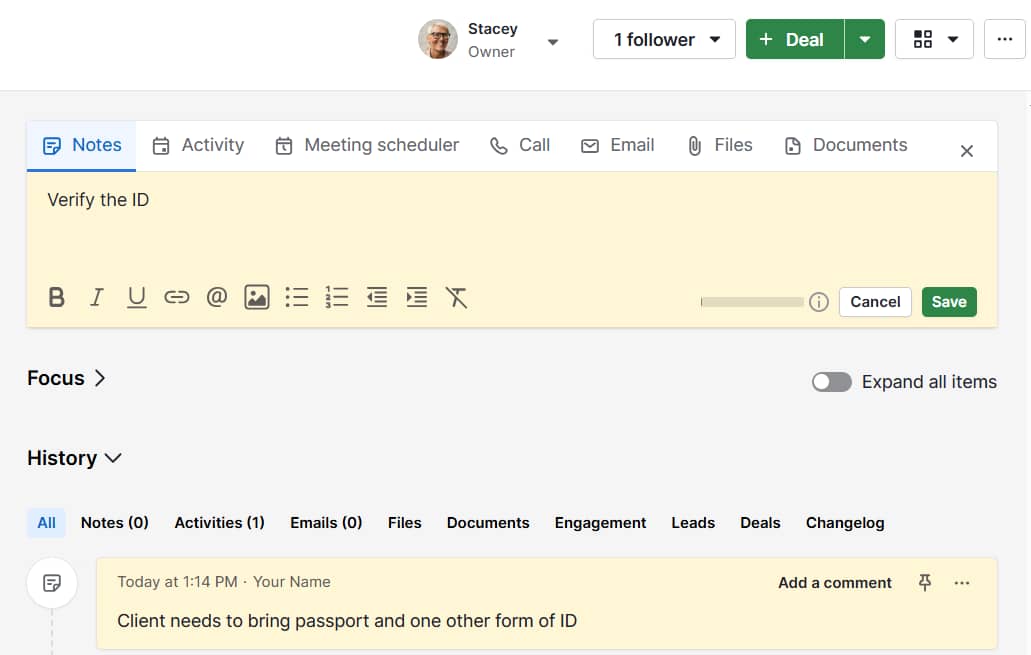
She checks which documents need notarization, confirms the client’s ID requirements and notes any special instructions.
Step 3: Notarization
During notarization, Maria logs each document the client signs. She seamlessly sends copies of the document to the client using Pipedrive’s Smart Docs feature and uses a payment and tracking tool integration to record the payment directly in Pipedrive.
If the client pays online, the system automatically updates the payment status.
Step 4: Follow-up
With notarization complete, Maria moves to follow up.
She uses a follow-up email template to send an automated thank-you email to her client.
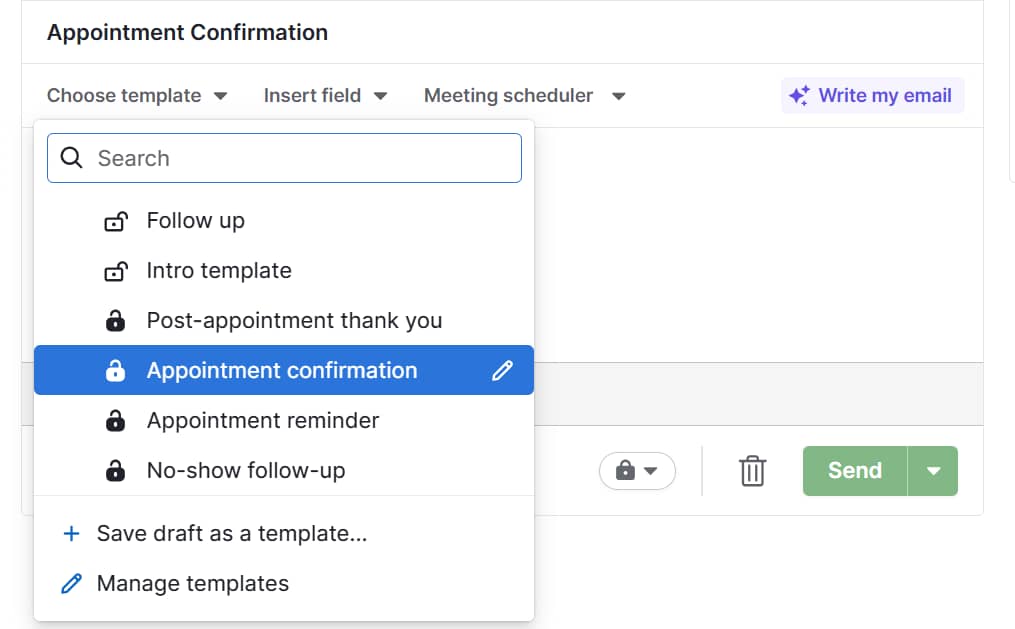
Pipedrive reminds Maria of any follow-up tasks, such as scheduling a future appointment or sending additional forms.
By the end of the day, all of Maria’s client records are current, and she has a clear snapshot of her upcoming appointments.
CRM for notaries FAQs
Final thoughts
With a robust CRM, you can keep your notary business organized, reduce the time you spend on repetitive tasks and help clients feel informed and valued.
The software handles the routine work so you can focus on delivering excellent service and pursuing your business goals.
Whether you’re a solo notary or growing a mobile signing business, a CRM helps you work accurately and efficiently. Start your free 14-day trial of Pipedrive today.







